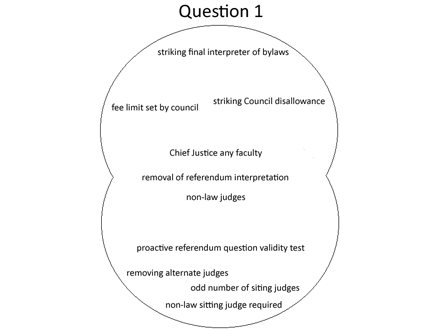Jan
18
Referendum: Student Court
Posted by: Alex Lougheed | January 18, 2010 | 2 Comments
Edit, Jan 21 2:30am: Much like the House and Senate reconciliate on health care reform, we misinterpreted how the original two questions were to be merged. The Chief Justice will still be required to be a third year law student if this referendum passes. Thanks for the comments, all. Keeps us on our toes.
On the ballot is two questions now apparently a single question designed to change the rules of student court. Overall, the main intent of the changes seem to be the closing of the author-named Lougheed Affair, where council exercised a disallowance power to not receive a ruling from the student court. This raised a crisis about the function of the student court, a body that sparsely met prior to the Affair, and caused council to launch a third-party review.
Being proposed is the removal council’s disallowance power, coupled with the authority of student court to interpret the bylaws, which could possibly be in contradiction with the B.C. Society Act. Beyond this change, there are also a number of riders dealing with some structural changes, and changes in the way referenda make their way to a vote.
Structural Changes
Structurally, it’s being proposed to make student court less of a law student hangout, by removing the requirement that the Chief Justice be from law, and requiring that two faculties be represented at each sitting. Aside from that, some obvious rules are being proposed, such as requiring an odd number of student judges to be at each sitting, and removing the awkward position of ‘alternate judges’ (who are only alternate, unless they’re needed, and then they’re full judges).
Referendum Process
Changes to the referendum process come because currently it’s easy for ambiguous questions to be asked to the student body. Today, when a petition is tabled that is ambiguous, student court is tasked with clarifying what is meant by the question.
A prime example of that would be the recently tabled disabilities seat referendum. The question does not specify wording to modify the bylaws, but instead naively states the bylaws should be amended. Status-quo, it’s up to student court to redraft the question to be sent to the membership, giving them the power to draft changes, which should be reserved by Council.
With the amendment, student court would simply give a “this is a valid question” or “this is an invalid question” ruling based on the question’s clarity. In short, with this change, if you’re going to ask a question you need to do your research and have an upfront check for compliance, prior to possibly wasting 1000 students’ time. There’s no reason to oppose this, especially since the bylaws already state AMS staff are available to assist in drafting these questions in a confidential capacity.
Still Has Problems
One thing the motions miss is whether AMS can or should impose fines upon specific members as a punishment. Currently, it’s written that student court can fine individuals if they’re found to be violating any rules or resolutions of the AMS, or for conducting “behavior deemed unbecoming” to a student.
Membership in the AMS is automatic upon University enrollment, and I don’t believe that alone gives the AMS legal force to compel individual members to act. That is a power reserved for the real courts, or other bodies enshrined in law, not private societies you have no ability to opt-out of.
For instance, if this private committee of students finds another student to be not in support of the UN Declaration of Human Rights, they could possibly be assessed a fine. Last I checked, that’s this body‘s job. The sole remedy for student court on individuals should be to remove the privilege of being an AMS member. I expect and hope for little compliance with the fees from students and the University if they’re ever levied.
In Summary
What’s being asked of you in this questions is effectively: “should a committee outside of the elections committee have final say on elections appeals?” Under the status-quo, council can (and given history, will) exercise disallowance, rendering any decision inert, meaning the buck stops with the elections committee.
Comments
2 Comments so far






Alex, I’m going to have to correct you regarding the Chief Justice. Looking at the proposed changes [1], only the statement regarding the alternate judges being from law is being repealed, largely because the alternate judges are being removed.
The proposed addition to 2.e of Bylaw 21 states: The Chief Justice shall be a member of the Law Constituency entering or enrolled in third year Law at UBC Vancouver.
[1] http://justinyang.ca/spectator/documents/Student%20Court%20and%20Referenda%20-%20Bylaw%20Changes.pdf
The Referendum Student Court is some thing really good for reading, I think such information has good to get know about and it is really nice to have an information about it.